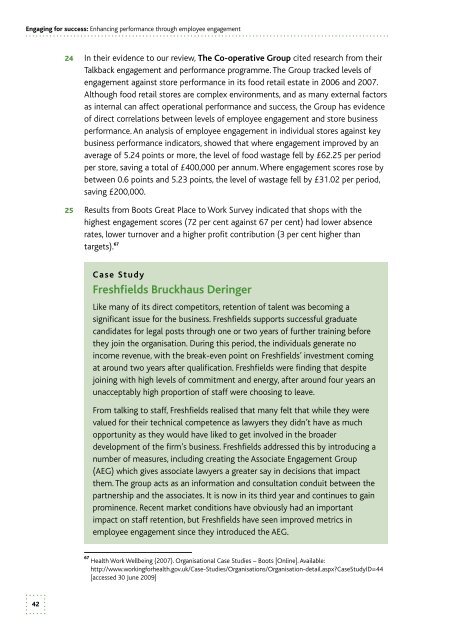3ytgeaf
3ytgeaf
3ytgeaf
You also want an ePaper? Increase the reach of your titles
YUMPU automatically turns print PDFs into web optimized ePapers that Google loves.
Engaging for success: Enhancing performance through employee engagement<br />
24 In their evidence to our review, The Co-operative Group cited research from their<br />
Talkback engagement and performance programme. The Group tracked levels of<br />
engagement against store performance in its food retail estate in 2006 and 2007.<br />
Although food retail stores are complex environments, and as many external factors<br />
as internal can affect operational performance and success, the Group has evidence<br />
of direct correlations between levels of employee engagement and store business<br />
performance. An analysis of employee engagement in individual stores against key<br />
business performance indicators, showed that where engagement improved by an<br />
average of 5.24 points or more, the level of food wastage fell by £62.25 per period<br />
per store, saving a total of £400,000 per annum. Where engagement scores rose by<br />
between 0.6 points and 5.23 points, the level of wastage fell by £31.02 per period,<br />
saving £200,000.<br />
25 Results from Boots Great Place to Work Survey indicated that shops with the<br />
highest engagement scores (72 per cent against 67 per cent) had lower absence<br />
rates, lower turnover and a higher profit contribution (3 per cent higher than<br />
targets). 67<br />
Case Study<br />
Freshfields Bruckhaus Deringer<br />
Like many of its direct competitors, retention of talent was becoming a<br />
significant issue for the business. Freshfields supports successful graduate<br />
candidates for legal posts through one or two years of further training before<br />
they join the organisation. During this period, the individuals generate no<br />
income revenue, with the break-even point on Freshfields’ investment coming<br />
at around two years after qualification. Freshfields were finding that despite<br />
joining with high levels of commitment and energy, after around four years an<br />
unacceptably high proportion of staff were choosing to leave.<br />
From talking to staff, Freshfields realised that many felt that while they were<br />
valued for their technical competence as lawyers they didn’t have as much<br />
opportunity as they would have liked to get involved in the broader<br />
development of the firm’s business. Freshfields addressed this by introducing a<br />
number of measures, including creating the Associate Engagement Group<br />
(AEG) which gives associate lawyers a greater say in decisions that impact<br />
them. The group acts as an information and consultation conduit between the<br />
partnership and the associates. It is now in its third year and continues to gain<br />
prominence. Recent market conditions have obviously had an important<br />
impact on staff retention, but Freshfields have seen improved metrics in<br />
employee engagement since they introduced the AEG.<br />
67<br />
Health Work Wellbeing (2007). Organisational Case Studies – Boots [Online]. Available:<br />
http://www.workingforhealth.gov.uk/Case-Studies/Organisations/Organisation-detail.aspxCaseStudyID=44<br />
[accessed 30 June 2009]<br />
42


